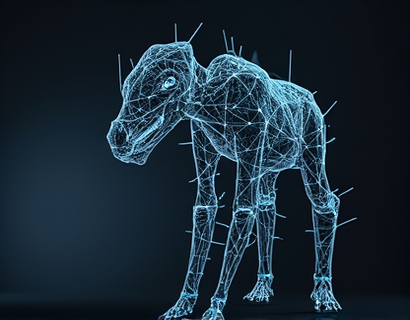Decentralized Authentication: Elevating Business Security and Streamlining Access with Advanced Technology
In the digital age, the importance of robust security measures cannot be overstated. As businesses increasingly rely on digital platforms to conduct operations, the need for advanced identity management solutions has become paramount. Decentralized authentication stands out as a transformative technology, offering a new paradigm for securing access and managing identities. This approach not only enhances security but also streamlines access, providing a seamless user experience while safeguarding sensitive data. For modern enterprises, adopting decentralized authentication is crucial for maintaining a competitive edge and ensuring operational efficiency.
Decentralized authentication, also known as decentralized identity management, operates on a fundamentally different principle compared to traditional centralized systems. In a centralized model, a single entity, often a server or a database, holds and manages all user credentials and identity information. This central point of control, while convenient, becomes a significant vulnerability. A breach in this central system can expose vast amounts of sensitive data, leading to severe security risks. Decentralized authentication, on the other hand, distributes identity management across a network of nodes, eliminating the single point of failure and significantly reducing the risk of large-scale data breaches.
The core concept of decentralized authentication revolves around blockchain technology and distributed ledgers. By leveraging these technologies, identity information is stored across multiple nodes, making it extremely difficult for malicious actors to manipulate or access. Each user has control over their own identity, with private keys and cryptographic signatures ensuring that only the rightful owner can authenticate. This shift from centralized to decentralized control not only enhances security but also empowers users, giving them greater autonomy over their personal data.
One of the primary benefits of decentralized authentication is the significant improvement in security. Traditional authentication methods, such as username-password combinations, are increasingly vulnerable to attacks like phishing, brute force, and credential stuffing. Decentralized systems mitigate these risks through the use of advanced cryptographic techniques. For instance, public-key infrastructure (PKI) ensures that only the owner of a private key can authenticate, making it nearly impossible for unauthorized users to gain access. Additionally, the immutable nature of blockchain ensures that once a transaction or authentication event is recorded, it cannot be altered, providing a tamper-proof record of all access attempts.
Beyond security, decentralized authentication significantly enhances operational efficiency. In a centralized system, managing user access and permissions can be cumbersome and time-consuming. With decentralized solutions, identity verification and access control are automated and distributed, reducing the administrative burden. This automation not only speeds up the authentication process but also minimizes the potential for human error. For businesses with a large workforce or complex access requirements, this efficiency gain can lead to substantial cost savings and improved productivity.
The seamless user experience offered by decentralized authentication is another critical advantage. Users no longer need to remember multiple passwords or go through lengthy verification processes. Instead, they can authenticate using a single, secure digital identity that is verified across the network. This simplicity not only enhances user satisfaction but also reduces the likelihood of users resorting to insecure practices, such as writing down passwords or using easily guessable combinations. By streamlining the authentication process, businesses can ensure that their employees and customers focus on their core activities without the distraction of cumbersome security protocols.
Implementing decentralized authentication involves several key components and technologies. At the heart of this system is the blockchain, which serves as the decentralized ledger for storing and verifying identity information. Smart contracts, self-executing contracts with the terms directly written into code, play a crucial role in automating the authentication process. These contracts can define specific rules and conditions for access, ensuring that only authorized users can gain entry to certain resources. Additionally, decentralized identifiers (DIDs) provide a unique, verifiable, and portable form of identification, further enhancing the flexibility and interoperability of the system.
Interoperability is a significant advantage of decentralized authentication. Unlike traditional systems that often operate in silos, decentralized solutions can integrate seamlessly with various platforms and applications. This interoperability ensures that users can authenticate across different services and devices without the need for multiple accounts or redundant verification steps. For businesses, this means a more cohesive and user-friendly experience, as well as the ability to leverage a wide range of tools and services without compromising security.
The adoption of decentralized authentication also aligns with the growing demand for privacy and data sovereignty. In an era where data breaches and misuse of personal information are common concerns, users are increasingly seeking control over their data. Decentralized identity management empowers individuals to manage their own identities, choosing what information to share and with whom. This level of control not only enhances trust but also complies with stringent data protection regulations such as the General Data Protection Regulation (GDPR) and the California Consumer Privacy Act (CCPA). For businesses, this compliance is not just a legal requirement but a competitive advantage in building customer trust.
From a technical perspective, the implementation of decentralized authentication requires a shift in infrastructure and processes. Organizations need to adopt blockchain-based platforms and integrate smart contracts into their identity management systems. This transition may involve collaboration with technology partners specializing in decentralized solutions. However, the long-term benefits far outweigh the initial investment. By modernizing their identity management infrastructure, businesses can future-proof their security posture and stay ahead of emerging threats.
Case studies and real-world applications demonstrate the effectiveness of decentralized authentication. For example, certain financial institutions have adopted decentralized identity solutions to enhance the security of online transactions and comply with regulatory requirements. These institutions report a significant reduction in fraud cases and improved customer trust. Similarly, tech companies have implemented decentralized authentication for their employee access management, resulting in streamlined onboarding processes and enhanced security for sensitive corporate data.
The future of decentralized authentication looks promising, with ongoing advancements in blockchain technology and increasing adoption across industries. As more organizations recognize the benefits of decentralized identity management, the ecosystem is likely to grow, with new tools and services emerging to support this paradigm shift. The integration of decentralized authentication with other emerging technologies, such as artificial intelligence and the Internet of Things (IoT), will further enhance its capabilities, making it an indispensable component of modern security strategies.
In conclusion, decentralized authentication represents a significant leap forward in business security and access management. By leveraging blockchain and distributed ledger technology, organizations can achieve a higher level of security, operational efficiency, and user satisfaction. As the digital landscape continues to evolve, embracing decentralized authentication will be essential for businesses aiming to protect their assets, comply with regulations, and deliver exceptional user experiences.











































